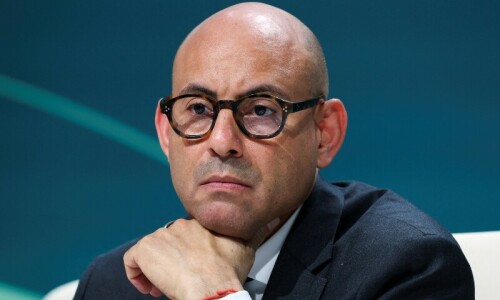
KABUL: The US may be in talks with the Taliban but its key challenge will be reaching out to the militants' elusive, one-eyed leader Mullah Omar as momentum builds for a peace deal in Afghanistan, experts say.
Afghan President Hamid Karzai said Saturday that the United States and other foreign countries were in contact with the Taliban, the first official confirmation of their involvement in talks after nearly ten years of war.
While diplomats say contacts are at a very early stage, Karzai's remarks show the increasing focus on a political settlement to the Afghan war after the death of Osama bin Laden and as foreign combat troops prepare to leave by 2014.
The support of the Taliban leader, for whom Washington offers a $10 million reward, is considered vital for any ceasefire or power-sharing deal.
But his location, long thought to be somewhere in Pakistan, remains a mystery.
The search has particular momentum given President Barack Obama's promise to start pulling out some of the 90,000 US troops from Afghanistan next month ahead of a full withdrawal within three years.
Pakistani analyst and author Imtiaz Gul told AFP that the US special representative for Afghanistan and Pakistan, Marc Grossman, asked for general assistance last month in tracking down Omar.
“Grossman told me the US is looking for people who can prove demonstrable access to Mullah Omar,” he said.
“I think the US considers Mullah Omar is still the key to Afghan peace. A US official told me: 'We don't want to remove him. We are very interested in talking to him.'”
Omar has long been thought to live in Pakistan's southwestern city of Quetta but Pakistan insists it has no idea where he is.
After al Qaeda leader bin Laden was killed by US forces in the Pakistani city of Abbottabad last month, most experts believe that Omar would have moved on quickly.
Afghanistan's intelligence service said shortly after bin Laden was killed that Omar had “disappeared from his hideout” in Quetta, without saying where he might have gone.
Western and Afghan officials in Kabul see assistance from Pakistan as crucial to efforts to open up a communication channel with Taliban leaders.
Karzai recently visited Islamabad, unusually for two days, and inaugurated a joint peace commission. Afghan officials now believe that Pakistan, where the Taliban leadership is believed to be based, is more willing to help.
“The dynamics in the relationship have changed quite substantively over the last few months,” an Afghan official told AFP on condition of anonymity.
“They now say very clearly that they have a role to play and we in Afghanistan have specific expectations of Pakistan.”
One such expectation is for Pakistan to “actively encourage Taliban leaders including Mullah Omar to join the reconciliation process,” he said.
Publicly, the Taliban insist they will not discuss peace until all 130,000 foreign troops leave the country.
“We have already said this and have repeated it many times. We have no negotiations with the United States,” said Zabihullah Mujahid, a Taliban spokesman.
But Germany's respected Der Spiegel magazine reported last month that Berlin had helped US officials contact Tayyab Aga, Omar's trusted personal secretary and brother-in-law, reportedly deputy head of a Taliban political commission.
Afghanistan analyst and former Pakistani intelligence official Brigadier Saad Khan said the contacts in Germany were “initial and exploratory” but that Aga took part “with the full blessing of Mullah Omar”.
“I think both the US and the Taliban realise they have to talk to each other,” Khan told AFP.
Whatever the status of talks, all sides clearly have a vested interest in keeping something so sensitive under wraps.
But in a situation of such shadowy uncertainty, the US and its allies will also be wary of repeating the kind of humiliating mistake which hit efforts to talk peace with the Taliban last year.
In November 2010, a man who claimed to be a senior Taliban commander was apparently brought to Kabul on a Nato aircraft to meet Karzai, before being exposed as a lowly shopkeeper from Quetta.















































Dear visitor, the comments section is undergoing an overhaul and will return soon.